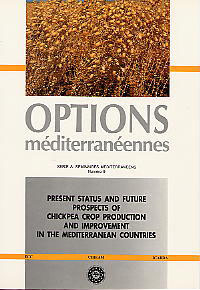| Article précédent | p. 93-99 | Article suivant |
Weed control in chickpea
Chickpea is a poor competitor to weeds because of slow growth rate and limited leaf area development at early stages of crop growth and establishment. In the Mediterranean region, however, chickpea is grown commonly as a spring crop and thus does not face a serious weed problem because of pre-sowing cultivation to control winter weeds. In winter sown chickpea weeds present a serious threat to the crop and yield losses up to 98 have been reported. Hand and mechanical weed control methods traditionally followed in the spring crop are not effective in winter sown chickpea beside being costly and uneconomical. Because of the sensitivity of chickpea to herbicides, the most effective herbicides are pre-sowing and pre-emergence soil-acting chemicals and their efficacity is highly dependent on soil type, moisture, temperature and wed flora. Post-emergence herbicides, particularly those for broad-leaf weeds are few.
- [ Afficher ]
- [ Télécharger ]
- [ Exporter la citation ]
Vous pouvez télécharger la citation au format :
- [ Imprimer ]
-
Mots-clés
CICER ARIETINUM, DESHERBAGE, DESHERBAGE MECANIQUE, HERBICIDE, MAUVAISE HERBE, REGION MEDITERRANEENNECiter cet article
Solh M.B., Pala M. Weed control in chickpea. In : Saxena M.C. (ed.), Cubero J.I. (ed.), Wery J. (ed.). Present status and future prospects of chickpea crop production and improvement in the Mediterranean countries. Zaragoza : CIHEAM, 1990. p. 93-99. (Options Méditerranéennes : Série A. Séminaires Méditerranéens; n. 9). Present Status and Future Prospects of Chickpea Crop Production and Improvement in the Mediterranean Countries, 11-13 Jul 1988, Zaragoza (Spain). http://om.ciheam.org/om/pdf/a09/91065004.pdf



